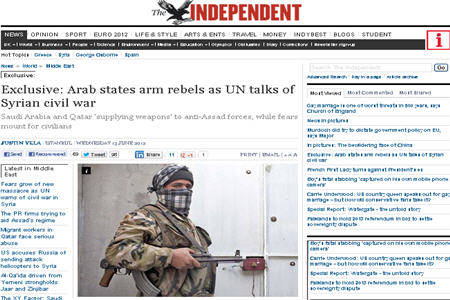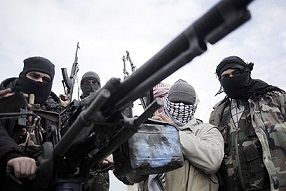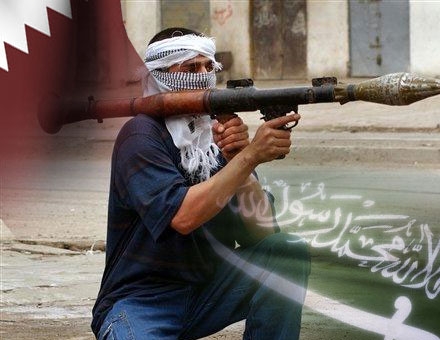Syrian rebels are being armed by Saudi Arabia and Qatar, The Independent has learnt, in a development that threatens to inflame a regional power struggle provoked by the 15-month-old uprising against the Assad regime

Syrian rebels are being armed by Saudi Arabia and Qatar, The Independent has learnt, in a development that threatens to inflame a regional power struggle provoked by the 15-month-old uprising against the Assad regime.
Rebel fighters from the Free Syrian Army (FSA) have received weapons from the two Gulf countries, which were transported into Syria via Turkey with the implicit support of the country's intelligence agency, MIT, according to a Western diplomat in Ankara. Opposition fighters in Syria have hitherto been handicapped by a reliance on an old and inadequate arsenal, while the regime in Damascus has been able to rely on a supply of arms from Russia and Iran. Moscow is arming Syria with attack helicopters, Hillary Clinton, the US Secretary of State, claimed yesterday. "We are concerned by the latest information we have that there are attack helicopters on the way from Russia to Syria, which will escalate the conflict quite dramatically," she told a conference in Washington.
Since the start of the uprising, anti-regime activists have only smuggled small quantities of weapons, purchased on the black market, from Hatay in southern Turkey into Syria's Idlib province.
However, three weeks ago, members of the loose assortment of rebel groups that comprises the FSA said they had received multiple shipments of arms including Kalashnikov assault rifles, BKC machine guns, rocket-propelled grenades and anti-tank weaponry from Gulf countries and that Turkey was assisting in the delivery of the weapons.
"The Turkish government helped us to be armed," said one member of the FSA living in the Turkey-Syria border area. He claimed that the weapons had arrived at a Turkish port via ship and were then driven to the border without interference from Turkish authorities.
 Saudi officials have in the past made clear their feeling that the rebels should be armed, with Saudi King Abdullah saying dialogue was "futile".
Saudi officials have in the past made clear their feeling that the rebels should be armed, with Saudi King Abdullah saying dialogue was "futile".
An Ankara-based Western diplomat, who spoke on a condition of anonymity, confirmed that the delivery of "light weapons" to the rebels was a "recent development", one that involved unmarked trucks transporting the weapons to the border for rebel groups. "There are arms coming in with the knowledge of the Turks," he said. The Syrian National Council (SNC), the main umbrella organisation of groups opposed to the regime, vetted the consignment.
The SNC is seen as having lost nearly all of its legitimacy with Syrian activists inside the country after failing to unite the fractured opposition. Yet, it appears that Turkey insisted the SNC vouch for the specific FSA groups that would receive the weapons before allowing the arms to cross the border.
"Officially, they are not going to admit it," the diplomat said. However, the SNC are "their guys", he said, referring to MIT. The vetting process was aimed at preventing the weapons from falling into the hands of Islamic extremists. Yet, the diplomat voiced concerns that, in practice, the weapons have only been delivered to rebels sympathetic to the Syrian Muslim Brotherhood, the dominant group within the SNC. "Only Muslim Brother groups are getting weapons," he said. Activists along the border not affiliated with the Muslim Brotherhood said they had not heard of the weapons being delivered until just a few days ago
However, the true strength of the Muslim Brotherhood inside Syria is still debated. The diplomat added that the SNC was "finished" due to pervasive in-fighting and that the rebels – who have become the dominant force in the revolution – "might grow a beard" to attract the attention of wealthy religious benefactors for a conflict he characterised as a "civil war".
Saudi and Qatari officials did not return requests for comment. At a "friends of Syria" conference in Tunisia in February, the Saudi delegation walked away from proceedings, warning that firmer action was needed. Before leaving, the Saudi Foreign Minister, Prince Saud al-Faisal, described the arming of the Syrian rebels as "an excellent idea".
A Turkish official said: "Turkey is not providing arms to anybody, nor sending armed elements to any neighbouring country, including Syria." He also reiterated that Western countries were still only providing "non-lethal" aid.
While it has hosted members of the FSA in refugee camps in Hatay, Turkey has been hesitant to directly involve itself in the conflict. However, following several cross-border shootings and reports that the regime is supporting Kurdish militants who have engaged in a 30-year conflict with Turkey, the country is changing course, said Andrew Tabler, a fellow at the Washington Institute for Near East Policy.
"Assad did not implement the Annan plan at all, that's the biggest thing," he said. "Turkey can see exactly the hurricane that is gathering."
Mr Tabler said videos uploaded to the internet showed more regime tanks were being destroyed, but cautioned that the weapons would not decisively turn the tide of the conflict. "These weapons are helping harass the regime forces, but these alone are not enough to bring down the regime," he said.
A rebel officer said their forces now control much of Bab al-Hawa, a Syrian town with a border gate to Turkey, and that having received the weapons and communications equipment, were preparing for an offensive in the coming days.
